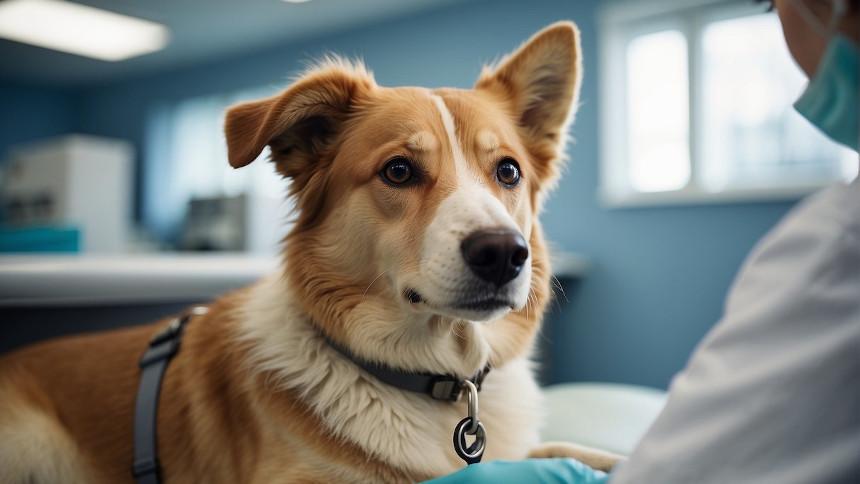When observing canine behavior, a common puzzlement among pet owners is why dogs eat grass. This habit can often lead to vomiting, causing concern and confusion. The act of dogs consuming grass is a widespread occurrence, yet it sparks numerous theories regarding the reasons behind it. Some suggest dogs may instinctively eat grass to relieve gastrointestinal upset or to fulfill some unmet nutritional needs, while others see it as a normal behavior with no underlying health implications unless it becomes excessive.
Vomiting following grass consumption is not experienced by all dogs. Statistical data indicates that a small percentage of dogs that eat grass will vomit regularly after doing so. This has led to widespread speculation that dogs might use grass as a natural emetic to rid their stomach of unwanted contents. However, there is no conclusive evidence to firmly establish this as fact, and veterinary experts often consider the occasional vomit post-grass eating as a non-specific symptom that could have multiple triggers including dietary indiscretions or minor stomach discomfort.
Understanding when grass eating is a sign of an underlying issue is important for dog owners. While it is generally not a cause for worry if a dog eats grass and vomits occasionally, consistent or sudden changes in this behavior could warrant further investigation. Keeping an eye on the frequency and accompanying symptoms is essential to ensure the well-being of the dog and to determine if a consultation with a veterinarian is necessary.
Understanding Grass Eating Behavior in Dogs
Grass eating in dogs can be a normal behavior or a sign of pica, a condition that involves eating non-food items. It is important to differentiate between the two to address potential health issues.
Normal Behavior or Pica?
Normal Behavior: Dogs may occasionally eat grass; this is generally considered to be normal and harmless. Several theories suggest that grass eating is a way for dogs to add fiber to their diet or relieve gastrointestinal discomfort.
Pica: This condition is characterized by the consumption of non-food items, and it may indicate a dietary deficiency or boredom. If a dog eats grass excessively or consumes other non-food items, it might suffer from pica and should be evaluated by a veterinarian.
Taste and Texture Preferences
Some dogs may simply enjoy the taste and texture of grass. They might prefer certain types of grass and select those that give them the taste or chewing sensation they find appealing.
Instinctual Behaviors from Wild Canids
Modern dogs have retained some behaviors from their ancestors, who were omnivorous. Wild canids would ingest plant material, including berries and herbs, as part of their diet. The following presents a possible link between domestic dogs and their wild counterparts:
| Behavior in Wild Canids | Possible Parallel in Domestic Dogs |
|---|---|
| Foraging for berries and herbs | Eating grass occasionally |
| Intake of plant fiber for digestion | Consumption of grass for fiber or gut relief |
This instinctual eating pattern may explain why some dogs appear to graze on grass despite being primarily carnivorous.
Potential Causes of Grass Eating and Vomiting
Grass eating followed by vomiting in dogs could indicate various underlying issues ranging from gastrointestinal discomfort to dietary imbalances.
Gastrointestinal Upset and Relief Seeking
Dogs often consume grass if they experience gastrointestinal upset or nausea as a natural attempt to induce vomiting for relief. The ingestion of grass can irritate the stomach and throat lining due to its texture, triggering a vomiting response that can purge the stomach’s contents.
Dietary Needs and Nutritional Deficiencies
A nutritional deficiency, particularly in fiber, may lead a dog to seek out grass. Consuming grass can be a dog’s way to supplement their diet, especially if their regular food lacks essential nutrients or fiber which is critical for a well-functioning gastrointestinal tract.
Presence of Intestinal Parasites
The ingestion of grass can sometimes be linked to the presence of intestinal parasites such as worms. Dogs with parasites may eat grass in an effort to soothe discomfort caused by the parasites or to expel them from their system through vomit.
It is important to monitor a dog’s behavior and consult a veterinarian if grass eating and vomiting become frequent, as this could indicate more serious health issues.
Evaluating Canine Behavior and Diet
Within the scope of canine behavior and diet, one may find that grass eating, often followed by vomiting, is a physical manifestation of deeper behavioral patterns or dietary needs.
Boredom and Behavioral Issues
Dogs may resort to eating grass out of boredom or as a display of underlying behavioral issues. To mitigate such behaviors, owners can introduce a variety of toys and activities to keep their pets engaged. Interactive toys that stimulate a dog’s senses are particularly effective. They can divert a dog’s attention from grass and provide alternative sources of entertainment.
The Role of a Balanced Diet
A balanced diet is central to preventing the ingestion of non-food items like grass. If dogs are fed a highly digestible complete diet, the urge to eat grass may diminish. However, should a dietary deficiency be suspected, a strategic diet change might be in order. Nutritionally complete and balanced foods tailored to a dog’s specific life stage can fulfill all their dietary needs, thereby curbing the tendency to consume non-nutritive items.
Health Risks Associated with Ingesting Grass
When dogs consume grass, health risks can arise, primarily due to possible contamination and the physical impact on their digestive system.
Exposure to Harmful Chemicals and Pesticides
Chemical Risks:
- Pesticides: The ingestion of grass treated with pesticides can lead to toxicity in dogs. Symptoms may include drooling, nausea, vomiting, and diarrhea.
- Fertilizers: Similar to pesticides, fertilizers may contain harmful chemicals that can cause gastrointestinal upset if ingested in significant quantities.
Prevention:
- Awareness: Be aware of any recent treatments to lawns or parks where your dog may graze.
- Alternative: Provide a safe area with untreated grass or introduce a pet-friendly herb garden.
Physical Risks: From Upset to Obstruction
Gastrointestinal Upset:
- Vomiting may occur either as a result of stomach irritation caused by the roughage of the grass or because the ingested grass is a response to a pre-existing upset stomach.
Potential Obstructions:
- Intestinal obstruction: A mass of undigested grass can lead to a blockage in a dog’s intestines, which is a serious condition that may require surgical intervention.
- Additional Concerns: Repeated grass ingestion can increase the risk of conditions like pancreatitis, particularly if the grass triggers repeated vomiting episodes.
Monitoring:
- Track frequency of grass ingestion and subsequent vomiting to identify patterns.
- Seek veterinary care if vomiting persists or if there are signs of distress, pain or change in behavior.
When to Consult a Veterinarian
It’s crucial to be aware of the signs indicating when grass consumption paired with vomiting necessitates professional veterinary care for a dog.
Symptoms That Require Medical Attention
If a dog exhibits persistent vomiting, especially if blood is present, it’s a sign to seek a veterinarian’s assistance promptly. Other symptoms that should not be ignored include:
- Lethargy or unexplained fatigue.
- Loss of appetite over 24 hours.
- A significant change in drinking habits.
- Signs of discomfort such as whining or restlessness.
- Fever, evident as warmth to the touch especially on the ears and paws.
- Weight loss, if it occurs rapidly or without explanation.
If any of these symptoms are observed, they could be indicative of an underlying gastrointestinal disease or other illness, and professional diagnosis is recommended.
Diagnosis and Treatment Options
Diagnosis by veterinarians often begins with a thorough clinical examination and may involve:
- Blood work: To detect infections, inflammation, or other health issues.
- Imaging tests: Like X-rays or ultrasounds to view the gastrointestinal tract.
The treatment plan devised by a veterinarian will vary based on the diagnosis but can include:
- Medications: To treat infections or target symptoms such as nausea.
- Dietary changes: Tailored to address food sensitivities or intolerances.
- Surgery: In severe cases that may involve obstructions or atypical conditions.
Effective treatment hinges on accurately identifying the cause, and veterinarians are best equipped to decide the safest approach for the dog’s well-being.
Preventive Measures and Remedies
In addressing canine grass eating and subsequent vomiting, owners can take proactive steps centered around environmental management and dietary adjustments, as well as providing behavioral enrichment. These strategies aim to minimize the behavior and support a dog’s health.
Environmental Management and Diet Adjustments
Environmental Management can greatly reduce a dog’s compulsion to eat grass. Owners should ensure their yards are free from fertilizers and herbicides, which can be harmful if ingested. Introducing safe and non-toxic plants into a dog’s environment can provide a healthier alternative for their grazing habits.
A Diet Change might be necessary if grass eating is linked to stomach issues. Owners may consider:
- Smaller and More Frequent Meals: Providing food in smaller quantities throughout the day can help with digestion.
- Digestive Supplements: Incorporating these can aid with gastrointestinal health and potentially reduce grass eating behavior.
Behavioral Enrichment and Alternative Activities
Behavioral Enrichment involves offering stimulating activities to divert a dog’s attention away from grass. This can include:
- Interactive toys
- Puzzle feeders to engage their minds
- Regular exercise to help reduce anxiety or boredom
Alternative Activities provide dogs with other options instead of grazing on grass. Suggestions include:
- Chew toys to satisfy their need to munch
- Training sessions to reinforce positive behaviors
- Supervised playtime in a grass-free environment
By implementing these measures, dog owners can mitigate the risks and address the underlying causes of their dog’s grass eating and vomiting tendencies.
Recognizing and Responding to Canine Vomiting
When a dog vomits, it can be a sign of many conditions ranging from trivial to serious. Understanding the nuances of vomiting versus regurgitation and identifying common causes are essential first steps in responding effectively.
Differentiating between Vomiting and Regurgitation
Vomiting is an active process where a dog will show signs of nausea, such as drooling and abdominal heaving, before expelling stomach contents. On the other hand, regurgitation involves the passive expulsion of food from the esophagus without prior nausea or abdominal effort.
Common Causes and Treatments for Vomiting
Causes of vomiting in dogs can be multifaceted. Common causes include:
- Dietary indiscretion: Eating inappropriate items can lead to stomach upset.
- Infections: Viruses like parvovirus or bacterial infections can cause vomiting.
- Parasites: Can lead to intestinal inflammation and vomiting.
- Systemic conditions: Kidney or liver failure can cause severe vomiting.
- Other diseases: Conditions such as cancer, heatstroke, bloat, or uterine infections also trigger vomiting.
For treatment of vomiting in dogs, consider the following steps:
- Withhold food: Depending on the severity, withhold food for 12-24 hours.
- Hydration: Offer small amounts of water frequently to prevent dehydration.
- Medication: Anti-emetics can be used under veterinary supervision for chronic vomiting.
- Dietary management: Introduce a bland diet, such as boiled chicken and rice, in small amounts.
- Veterinary care: Chronic or intense vomiting or accompanying symptoms like abdominal pain, depression, weakness, or dehydration necessitate immediate veterinary attention. They may suggest diagnostic tests to identify underlying causes such as cancer, kidney/liver failure, or viral infections like parvovirus.
Treatment should be tailored to the underlying cause, which may require lab tests or imaging to diagnose. It’s essential to address chronic conditions, such as kidney or liver failure, with specific veterinary-guided management plans.
Conclusion: A Holistic Approach to Canine Health
When observing dogs eating grass, it’s crucial to consider their overall well-being. Vomiting can occur after a dog ingests grass, but this is not always indicative of a health issue. The taste of grass may be appealing to some dogs, and they may ingest it without any subsequent health concerns.
For dogs with upset stomachs, consuming grass might occasionally lead to vomiting, which in some cases can provide relief. However, this is not a one-size-fits-all behavior and shouldn’t be assumed as the sole reason for a dog’s ingestion of grass. Understanding biliary vomiting syndrome, where a dog vomits bile after eating grass, requires attention as it may indicate other health issues.
Owners should consider a balanced view of their pet’s behavior. Regular petting and interaction can lead to early detection of distress signals if a dog suddenly changes its grass-eating habits. A routine check-up from a veterinarian can help assure owners that their dog’s grass consumption is either a harmless preference or a sign of a health problem requiring attention.
| Potential Causes of Grass Eating | Response |
|---|---|
| Boredom or Dietary Fiber Need | Observe and consider enriching the dog’s environment or diet. |
| Nausea or Upset Stomach | Consult a veterinarian if frequent. |
| Taste Preference | Typically harmless unless accompanied by frequent vomiting. |
In sum, the act of a dog eating grass should be viewed within the context of their overall health and behavior. Observation and professional consultation are key in ensuring a dog maintains a healthy life.








